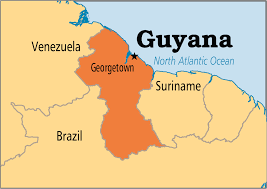 In the mid 1600s, Jewish settlers arrived in the Dutch colony of Essequibo, the forerunner of what became British Guiana and today’s Guyana. In 1658, the Dutch agreed with David Nassy to establish a colony of Jews on the Pomeroon River. Around 50 to 60 families Jewish families arrived, specializing in sugar cane plantations and vanilla.
In the mid 1600s, Jewish settlers arrived in the Dutch colony of Essequibo, the forerunner of what became British Guiana and today’s Guyana. In 1658, the Dutch agreed with David Nassy to establish a colony of Jews on the Pomeroon River. Around 50 to 60 families Jewish families arrived, specializing in sugar cane plantations and vanilla.
The colony flourished, becoming a prized possession of the Dutch, until its destruction in 1666 by an incursion by the English. the Jews of Pomeroon left, following the destruction of their colony, mostly to Suriname, where they were granted unprecedented religious freedoms.
In the late 19th and early 20th centuries, several Jewish families immigrated to British
Guiana from Arab lands to avoid persecution and expand business opportunities.
 Before the outbreak of World War II there were a handful of Jews in the capital, Georgetown, but there was neither an organized community nor a synagogue. Early in 1939, 165 Jewish refugees from Europe, who arrived on the S.S. Koenigstein, were not permitted to disembark, and shortly thereafter the government barred immigration. However, 130 Jews found refuge in the country during the war years but most of these eventually emigrated.
Before the outbreak of World War II there were a handful of Jews in the capital, Georgetown, but there was neither an organized community nor a synagogue. Early in 1939, 165 Jewish refugees from Europe, who arrived on the S.S. Koenigstein, were not permitted to disembark, and shortly thereafter the government barred immigration. However, 130 Jews found refuge in the country during the war years but most of these eventually emigrated.
The Jewish population was around 40 in the mid 1990’s. However, the country had a Jewish president. President Janet Rosenberg Jagan, was elected to Parliament in 1973 and was re-elected in 1980, 1985, and 1992, eventually becoming the longest-serving member of Parliament (46 years). She was awarded Guyana’s highest national award, the Order of Excellence, in 1993, and the UNESCO Mahatma Gandhi Gold Medal for Women’s Rights in 1998.